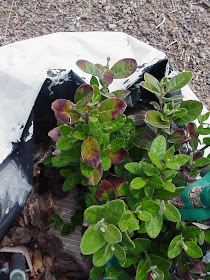Q. I saw that on August 12th you responded to a question
regarding yellowing leaves on a Meyer lemon tree. My tree has similar symptoms - though the
yellowing is more spotty and on tips.
You advised to "give it a long deep watering about once every few
weeks...to supplement the regular water to leach out the salts..."
(emphasis added).
I
realize that soil make-up effects watering needs, but can you give me a
ballpark as to how many gallons of
"regular water" per week is needed for these trees in Las
Vegas in addition to the leaching you recommended? My tree is approximately 7 feet tall. Should
I spread these gallons out over a few days a week, or is giving it these
gallons slowing on a single day once a week?
A. That’s actually a very interesting question and we
have some research to back up the amount. There is about one ton of different
kinds of salts (all of these together make up the "salt" content) in
one acre foot of water that comes from the Colorado River (Lake Mead).
.JPG) |
| Rose leaf with salt damage |
An acre
foot of water is about 360,000 gallons. Unless you are on a well, this
represents about 80% of the drinking and irrigation water provided by water
purveyors (Las Vegas Valley Water District in the case of Las Vegas) in the Las
Vegas Valley.
This
sounds like it could be quite dilute but actually when you water to a lawn from
Lake Mead it will carry 4/5 ton of salt for every 360,000 gallons that are
applied. This translates to an application of 800 pounds of salt for every 1000
square feet of lawn area each year.
 |
| Salt damage to pineapple guava from salt in the irrigation water |
Bottom
line, if this is municipal water it carries a considerable amount of salt. If
you skimp on the amount of water that you apply and don’t overwater a little
bit, this salt will accumulate around the roots of plants. This "little
bit" of overwatering each time you water is only about 15%.
So if
you apply 100 gallons you really should apply 115 gallons to help move the
salts out of the root zone of plants. If it is 50 gallons, then apply an extra
7.5 gallons. Ten gallons means you should apply 11.5 gallons.
Few
people are this precise when they water unless they are watering a golf course
and paying $1M each year to irrigate an 18 hole golf course. So when you water
you can apply a little bit extra each time you water (15%) or you can flush out
the salts around the roots by adding an extra irrigation or two during the hot
months to keep those salts moving out. I hope this helps.

This is very good information. I wish I had it before salt killed 3 of our young trees, but I still appreciate having it. Thank you.
ReplyDeletehttp://wateruseitwisely.com/region/arizona/100-ways-to-conserve/outdoor-tips/water-guides/Landscape-Watering-Guide.pdf
ReplyDeleteDeep irrigate---you are watering trees, not grass. That means deep and infrequent. Think 3 or 4 feet down. I am beginning to think you cannot overwater new/young trees in the summer time in our environments. (you can but get that kind of attitude) Check water levels. You can do it with a piece of rebar sharpened at one end makes it easier and as it becomes time to water again a foot long screwdriver. You will get used to the feel of hitting dry soil.